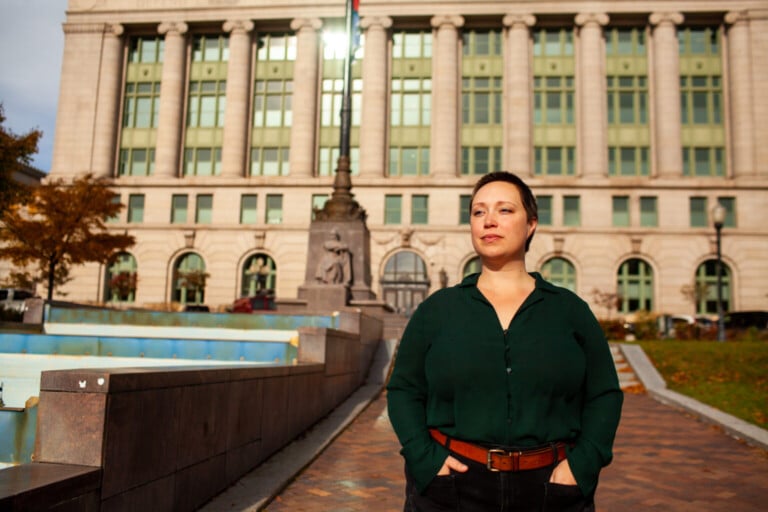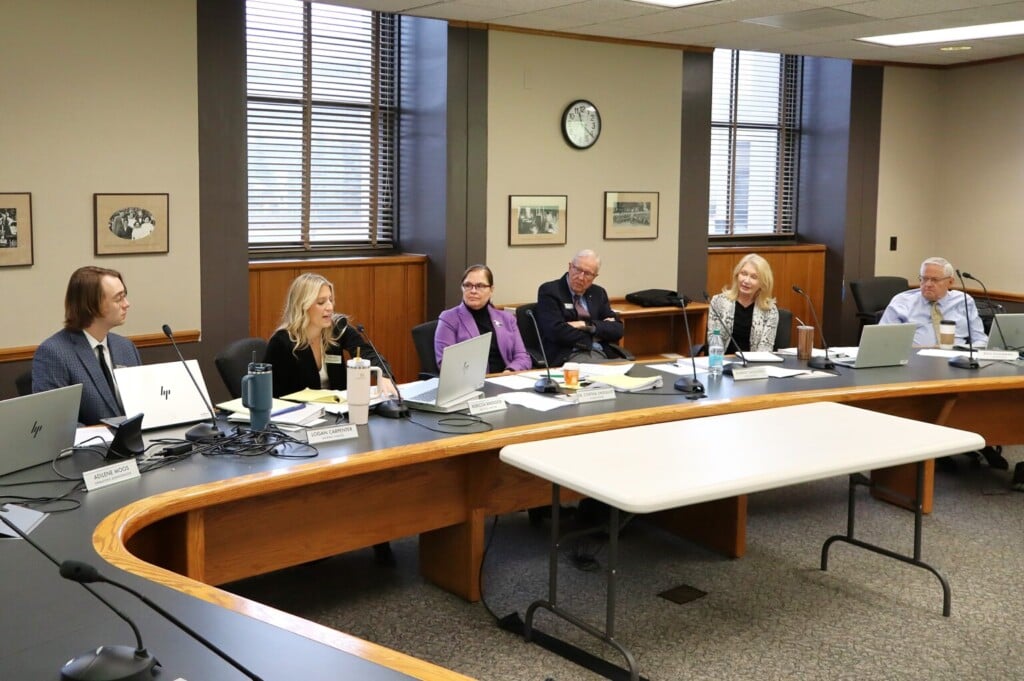Want an AI data center in your city? Sure, but first sign this non-disclosure agreement.

DULUTH, Minn. (Minnesota Reformer) — Leaders in small Minnesota communities are helping big tech companies dot the state with gigantic computers used to power AI, often under the cloak of code names and nondisclosure agreements — which legal experts and residents say is damaging public trust.
City councilors, mayors and other elected officials across the state have been aware for months, even years, of various massive AI data center proposals, while sharing little to no information publicly until the projects are set in motion — often bound by secrecy agreements.
The City of Hermantown, muzzled by nondisclosure agreements, called a proposal “Project Loon” in early planning documents. If approved, the project would comprise over 200 acres of the wooded Duluth suburb with 1.8 million square feet worth of AI data processors.
Power and water consumption — and even the identity of the company that will use the campus — are still under wraps even as the project reaches the permitting stage.
Jane Kirtley, a professor of media law and ethics at the University of Minnesota, said the phenomenon of elected officials signing secrecy agreements isn’t entirely surprising: “Many of them are willing to sign their lives away in order to lure the businesses to their area.”
Still, Kirtley said, the non-disclosure agreements are “extremely problematic” because they compound the problem of opaque local government: “In smaller communities where there’s often less oversight, where fewer media are paying attention to it and fewer citizens participating, councils can get away with an awful lot of secrecy for a very long time without anybody complaining about it,” she said.
The jurisdictions cooperating with the tech behemoths say they’re in fierce competition with rival cities, counties and states and want to be able to negotiate privately, while the companies say they are guarding proprietary information and need the secrecy that an NDA guarantees.
The data centers provide jobs to construction workers who build and maintain them, and piles of property tax money for often cash-starved local governments.
Some elected officials have had enough, however, and are refusing to go along, while a state lawmaker wants to make these nondisclosure agreements illegal for elected officials.
‘A total disservice to our office’
When St. Louis County Commissioner Ashley Grimm heard her colleagues knew about the proposed Hermantown campus a full six months before the public, she said she was “shocked.”
Hermantown is in south St. Louis County.
“To say that we would sign away our rights to talk to our constituents about that (data center project) is a total disservice to our office,” she said. Grimm scoffed at the idea that constituents had to file public records requests to get information.
Much of the available information related to the Hermantown proposal was made public recently through a Data Practices Act request — which is Minnesota’s version of a public records request and named after the state’s open records law — filed by Minnesota Center for Environmental Advocacy, or MCEA.
The records include hundreds of pages of correspondence between consultants, city staffers and local elected officials regarding “Project Loon,” some dating back more than a year. (Additional documentation can be found on citizen-led stopthehermantowndatacenter.org.)
Grimm said the secrecy surrounding Project Loon motivated her to propose a prohibition on commissioners signing nondisclosure agreements when big data center projects come to town.
Her proposal was quickly rejected during a heated commission meeting earlier this month.

Protest signs stand in a front yard near the land earmarked for a large proposed data center campus in Hermantown, Minnesota, just outside of Duluth, is shown Friday, Oct. 24, 2025. (Photo by Nicole Neri/Minnesota Reformer)
‘I don’t give a s*** what you think’
The meeting room was packed, but the county commission allotted no time for the public to comment on Grimm’s proposal. At one point after the meeting, Commissioner Keith Nelson, one of three who signed a nondisclosure agreement, repeatedly told a Duluth Monitor reporter on video “I don’t give a sh*t what you think” about there being no opportunity for public comment.
Nelson did not respond to a request for comment on the interaction.
Instead, the county provided to the Reformer a statement on NDAs.
“In the economic development world, this is common practice as developers do their due diligence during their evaluation phase to determine a project’s feasibility without tipping their hat to a competitor. St. Louis County signed a non-disclosure agreement so that we could receive information that is considered confidential and proprietary. Should the developer decide to move forward, the public will be provided opportunity to weigh in on any involvement the county may have with this project.”
MCEA Executive Director Kathryn Hoffman replied, “We’re just way past the point where that argument makes any sense.”
MCEA has filed four lawsuits against cities that have advanced data center projects with what MCEA alleges are a lack of transparency and incomplete environmental reviews: Faribault, Pine Island, North Mankato and Lakeville.
Hoffman allowed that city staff could conceivably be required to sign a secrecy agreement. If an elected official signs one, however, the NDA could easily become a cover for something else entirely, Hoffman charged: secret lobbying.
A legislative response
Major AI data center projects — campuses known in the industry as “hyperscale” — are planned for Farmington and Rosemount, and both achieved significant momentum before the public knew anything about them.
In Farmington’s case, city officials did not speak publicly about the development until Tract — the company building the campus — presented its project application during a City Council meeting.
Farmington City Administrator Lynn Gorski said in a statement that “it’s not uncommon to not speak publicly about any project until an application is received.” Gorski emphasized that the application materials — like details of the environmental review — are public, and that to date the city of Farmington has not approved any data centers.
State Sen. Erin Maye Quade, DFL-Apple Valley, said she grew concerned as she learned about the Rosemount project, which will host Facebook parent Meta.

Construction continues on the sprawling Rosemount Data Center on land bought by Meta near Dakota County Technical College, shown Thursday, May 29, 2025. (Photo by Nicole Neri/Minnesota Reformer)
Like in Hermantown, the proposal was listed in early planning documents under a code name: “Project Bigfoot.” An employee of the tech giant attended public meetings and corresponded with local officials using the alias “Ken Confidential,” Maye Quade recalled.
Maye Quade’s district falls on the project’s border.
Maye Quade proposed a bill earlier this year that would have barred local officials from signing nondisclosure agreements when planning data centers. It failed.
“I’m appalled that these large multi-billion dollar international corporations are entering into NDA’s with cities where you might not have a full-time mayor or city council,” Maye Quade said. The problem, she said, is that secrecy requirement exacerbates the power differential between a tech company and small city mayors.
“The Legislature should provide citizens the opportunity to be involved. NDAs are taking local communities’ rights away from being involved; our basic democratic, fundamental right is to participate in the process.”
Maye Quade said she will try again during next year’s legislative session, and expects more support — and bipartisan support at that.
Many of her Republican colleagues are on board, she said: “You could sit us all on a panel and ask ‘What are three things you agree upon?’ and it would be one thing — the needed regulation for big tech and AI.”
(Story written by Peyton Haug – Minnesota Reformer)






